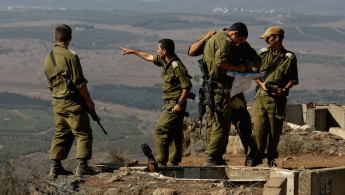Israel says it opposes peace in southern Syria due to Iran fears
Israel says it opposes a US and Russian-sponsored ceasefire in southern Syria which could end the horrific regime bombing of towns and villages, fearing peace could benefit arch-rival Iran.
Prime Minister Binyamin Netanyahu told reporters in Paris that a ceasefire in southern Syria would help Tehran establish a permanent presence in areas close to territory illegally occupied by Israel.
His fears echo the stated concerns of the country's intelligence services about Israel's public enemy number one, which backs a variety of Palestinian and Lebanese militant groups such as Hamas and Hizballah.
Officials told Haaretz they not only believed the truce would give Iranian "peacekeepers" a presence close to the Golan Heights - an area of Syria occupied by Israel's military and annexed by Tel Aviv in 1981 - but also allow Tehran to establish air and naval bases.
"The agreement as it is now is very bad," one senior Israeli official told Haaretz.
"It doesn't take almost any of Israel's security interests and it creates a disturbing reality in southern Syria. The agreement doesn't include a single explicit word about Iran, Hizballah or the Shia militias in Syria."
Iran-backed militias have been key to regime offensives in southern Syria, including Daraa province which shares borders with Jordan - which backs the truce - and the Golan Heights.
Tehran is a major backer of the Syrian regime and has sent thousands of Revolutionary Guards and Shia militia fighters to bolster Damascus' decimated armed forces.
Israel is also said to be wary of Russian peacekeepers close to the Golan territories.
Netanyahu's comment is Israel's first public opposition to the US-Russian truce agreement for southern Syria, agreed when President Donald Trump and President Vladimir Putin met at the G20 summit earlier this month.
The peace plan has been strongly backed by Trump and US diplomatic chief Rex Tillerson, and mirrors other similar Russian-Turkish-Iranian truces in Syria.
Despite large parts of the country being covered by "de-escalation zones", Daraa has come under a horrendous offensive by regime forces, which has seen the use of napalm, an incendiary weapon banned under international law.





 Follow the Middle East's top stories in English at The New Arab on Google News
Follow the Middle East's top stories in English at The New Arab on Google News
![The UAE is widely suspected of arming the RSF militia [Getty]](/sites/default/files/styles/image_330x185/public/2024-11/GettyImages-472529908.jpg?h=69f2b9d0&itok=Yauw3YTG)
![Netanyahu furiously denounced the ICC [Getty]](/sites/default/files/styles/image_330x185/public/2024-11/GettyImages-2169352575.jpg?h=199d8c1f&itok=-vRiruf5)
![Both Hamas and the Palestinian Authority welcomed the ICC arrest warrants [Getty]](/sites/default/files/styles/image_330x185/public/2024-11/GettyImages-2178351173.jpg?h=199d8c1f&itok=TV858iVg)